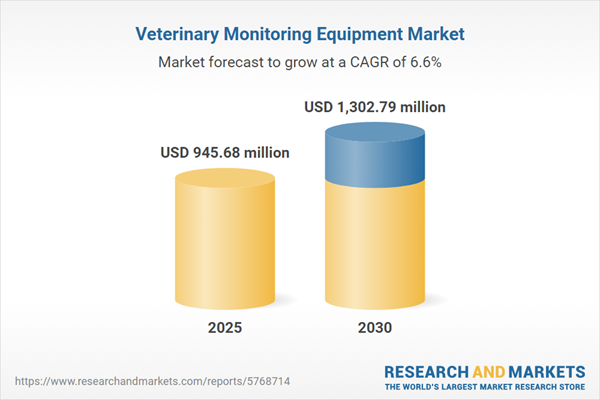The global veterinary monitoring equipment market is set for significant growth, driven by the increasing number of pet owners and heightened awareness of animal healthcare needs. This market encompasses devices designed to monitor vital signs such as blood pressure, respiration, heart rate, and body temperature, as well as facilitate early disease diagnosis in animals. The rise in pet ownership, particularly in developed regions, is boosting demand for advanced monitoring solutions to ensure animal health and post-surgical recovery. The market is further propelled by the growing livestock population globally, which increases the need for monitoring equipment to manage health risks in large animal populations. Despite these opportunities, challenges such as high equipment costs and limited awareness in developing regions may hinder growth.
Market Drivers
Increased Pet Ownership
The surge in pet ownership is a primary driver of the veterinary monitoring equipment market. With more households adopting pets, there is a corresponding increase in spending on animal healthcare, including monitoring devices. The growing inclination of pet owners to invest in advanced healthcare solutions has opened opportunities for vendors to develop innovative equipment tailored to companion animals. This trend is particularly pronounced in regions with high pet ownership rates, where demand for tools to monitor vital signs and ensure speedy recovery post-surgery is rising.Growing Livestock Population
The large livestock population in various regions contributes significantly to market demand. A higher livestock population increases the likelihood of health issues, necessitating advanced monitoring equipment to manage diseases and ensure animal welfare. This is particularly relevant in countries with substantial agricultural sectors, where monitoring devices are critical for maintaining herd health and productivity.Technological Advancements
The adoption of wearable technology and digital solutions is transforming the veterinary monitoring landscape. Devices such as wearable sensors, like Vetrax, enable real-time monitoring of animal behavior and health metrics, providing veterinarians and owners with timely insights for accurate diagnoses. The integration of digital technologies is accelerating, driven by the need for efficient, data-driven healthcare solutions in both companion and livestock animals.Geographical Outlook
North America
North America, particularly the United States, holds a dominant share of the veterinary monitoring equipment market. This is driven by a strong emphasis on animal health, growing awareness among pet owners and veterinarians, and the presence of leading market players. The region benefits from increased investments in research and development, as well as the rapid adoption of advanced technologies. The growing popularity of pet health insurance, with policies becoming more affordable, further supports market growth by encouraging spending on veterinary care. Additionally, the use of wearable monitoring devices is gaining traction, with high satisfaction rates among pet owners for their effectiveness in managing conditions like weight and diabetes.The veterinary monitoring equipment market is poised for robust growth, fueled by rising pet ownership, a growing livestock population, and advancements in wearable and digital technologies. North America leads the market, driven by strong awareness, investment in innovation, and widespread adoption of pet insurance. While challenges like high costs may persist, the increasing demand for health monitoring solutions and the integration of advanced technologies position the market for sustained expansion, offering significant opportunities for vendors to meet the evolving needs of pet and livestock owners.
Key Benefits of this Report:
- Insightful Analysis: Gain detailed market insights covering major as well as emerging geographical regions, focusing on customer segments, government policies and socio-economic factors, consumer preferences, industry verticals, and other sub-segments.
- Competitive Landscape: Understand the strategic maneuvers employed by key players globally to understand possible market penetration with the correct strategy.
- Market Drivers & Future Trends: Explore the dynamic factors and pivotal market trends and how they will shape future market developments.
- Actionable Recommendations: Utilize the insights to exercise strategic decisions to uncover new business streams and revenues in a dynamic environment.
- Caters to a Wide Audience: Beneficial and cost-effective for startups, research institutions, consultants, SMEs, and large enterprises.
What do businesses use these reports for?
Industry and Market Insights, Opportunity Assessment, Product Demand Forecasting, Market Entry Strategy, Geographical Expansion, Capital Investment Decisions, Regulatory Framework & Implications, New Product Development, Competitive IntelligenceReport Coverage:
- Historical data from 2022 to 2024 & forecast data from 2025 to 2030
- Growth Opportunities, Challenges, Supply Chain Outlook, Regulatory Framework, and Trend Analysis
- Competitive Positioning, Strategies, and Market Share Analysis
- Revenue Growth and Forecast Assessment of segments and regions including countries
- Company Profiling (Strategies, Products, Financial Information, and Key Developments among others.
Segmentation:
By Type
- Anaesthesia Monitors
- Capnography & Oximetry Systems
- ECG & EKG Monitors
- MRI Systems
- Vital Sign Monitors
- Others
By Application
- Cardiology
- Multi-parameter Monitoring
- Neurology
- Respiratory Disorders
- Weight & Temperature Monitoring
- Others
By Animal Type
- Companion Animals
- Livestock
By End-User
- Veterinary Clinics & Diagnostic Centers
- Veterinary Hospitals
- Research Institution
By Geography
- North America
- USA
- Canada
- Mexico
- South America
- Brazil
- Argentina
- Others
- Europe
- Germany
- France
- United Kingdom
- Spain
- Others
- Middle East and Africa
- Saudi Arabia
- UAE
- Others
- Asia Pacific
- China
- India
- Japan
- South Korea
- Indonesia
- Thailand
- Others
Table of Contents
Companies Mentioned
- Agfa-Gevaert Group
- Bionet America Inc
- Burtons Medical Equipment
- Covetrus
- Digicare Biomedical
- DRE Veterinary (Avante Health Solutions)
- ESAOTE SPA
- Hallowell Engineering & Manufacturing Corporation
- IMV Technologies
- Jorgensen Labs
- Masimo
- Medtronic
Table Information
| Report Attribute | Details |
|---|---|
| No. of Pages | 165 |
| Published | August 2025 |
| Forecast Period | 2025 - 2030 |
| Estimated Market Value ( USD | $ 945.68 million |
| Forecasted Market Value ( USD | $ 1302.79 million |
| Compound Annual Growth Rate | 6.6% |
| Regions Covered | Global |
| No. of Companies Mentioned | 12 |









